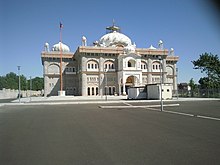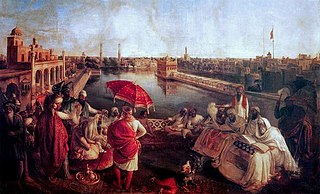
Sikhs are people who adhere to Sikhi or Sikhism, an Indian religion that originated in the late 15th century in the Punjab region of the Indian subcontinent, based on the revelation of Guru Nanak. The term Sikh has its origin in the Sanskrit word śiṣya (शिष्य), meaning 'disciple' or 'student'.
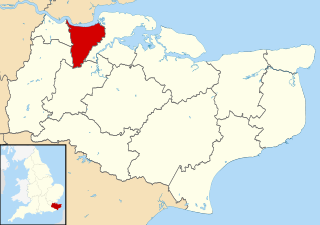
Gravesham is a local government district with borough status in north-west Kent, England. Its administrative centre and largest town is Gravesend, which was known as Gravesham in ancient times.
A gurdwara is a place of assembly and worship for Sikhs. Sikhs also refer to gurdwaras as Gurdwara Sahib. People from all faiths are welcomed in gurdwaras. Each gurdwara has a Darbar Sahib where the current and everlasting guru of the Sikhs, the scripture Guru Granth Sahib, is placed on a takhat in a prominent central position. Any congregant may recite, sing, and explain the verses from the Guru Granth Sahib, in the presence of the rest of the congregation.
The following outline is provides an overview of Sikhism, or Sikhi.
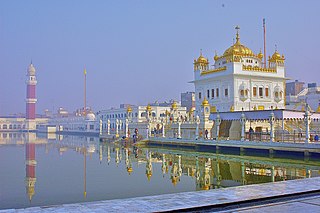
Tarn Taran Sahib is a city in the Majha region of the state of Punjab, in northern India. It is the district headquarters and hosts the municipal council of Tarn Taran district. Gurdwara Sri Tarn Taran Sahib, a prominent Sikh shrine is located in the central part of the city.

Gurdwara Sri Guru Singh Sabha Southall (SGSS) is a Sikh gurdwara situated on Guru Nanak Road and Park Avenue, Southall, in the London Borough of Ealing. It is the largest Sikh temple in London. Building work at the Havelock Road site commenced in March 2000 and the gurdwara opened on Sunday 30 March 2003, in order to accommodate Southall's growing Sikh community. The gurdwara cost £17.5 million to build. It was funded by donations from members of the local Sikh community.

Kartarpur is a town located, in the Shakargarh Tehsil, Narowal District in Punjab, Pakistan. Located on the right bank of the Ravi River, it is said to have been founded by the first guru of Sikhism, Guru Nanak, where he established the first Sikh commune.

Nanakpanthis is a Sikh sect which refers to followers of the teachings of Guru Nanak (1469-1539), the foundational guru of a spiritual community natively known as Nanakpanth while known world-wide as Sikhism. Nanakpanth is an open frontier that references strongly an early Sikh community. Nanakpanthi signifies any person, regardless of any religious affiliation, who follows Guru Nanak and believes in his teachings of Universal brotherhood, Truth, Love, Tolerance, Compassion and most importantly Oneness of one single formless Waheguru.

Sikh architecture is a style of architecture that was developed under the Sikh Confederacy and Sikh Empire during the 18th and 19th centuries in the Punjab region. Due to its progressive style, it is constantly evolving into many newly developing branches with new contemporary styles. Although Sikh architecture was initially developed within Sikhism its style has been used in many non-religious buildings due to its beauty. 300 years ago, Sikh architecture was distinguished for its many curves and straight lines; Shri Keshgarh Sahib and the Sri Harmandir Sahib are prime examples.
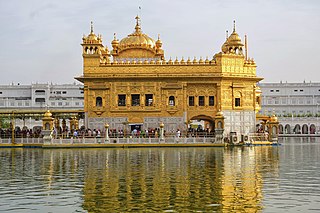
Indian Sikhs number approximately 21 million people and account for 1.7% of India's population as of 2011, forming the country's fourth-largest religious group. The majority of the nation's Sikhs live in the northern state of Punjab, which is the only Sikh-majority administrative division in the world.

The Delhi Sikh Gurdwara Management Committee (DSGMC) is organization in India responsible for the management of Gurdwaras, Sikh places of worship in Delhi. It also manages various educational institutions, hospitals, old age homes, libraries and other charitable institutions in Delhi. It is headquartered in Gurdwara Rakab Ganj Sahib, near Parliament House. Currently, the president of DSGMC is Harmeet Singh Kalka.

English Sikhs number over 520,000 people and account for 0.92% of England's population in 2021, forming the country's fourth-largest religious group. In 2006 there were 352 gurdwaras in England. The largest Sikh populations in the U.K. are in the West Midlands and Greater London.

Gurdwara Darbar Sahib Kartarpur, also called Kartarpur Sahib, is a gurdwara in Kartarpur, located in Shakargarh, Narowal District, in the Punjab province of Pakistan. It is built on the historic site where the founder of Sikhism, Guru Nanak, settled and assembled the Sikh community after his missionary travels and lived for 18 years until his death in 1539. It is one of the holiest sites in Sikhism, alongside the Golden Temple in Amritsar and Gurdwara Janam Asthan in Nankana Sahib.

Gurū Nānak, also referred to as Bābā Nānak, was the founder of Sikhism and is the first of the ten Sikh Gurus. His birth is celebrated worldwide as Guru Nanak Gurpurab on Katak Pooranmashi, i.e. October–November.
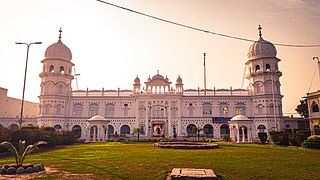
Gurdwara Janam Asthan, also referred to as Gurdwara Nankana Sahib, is a highly revered gurdwara that is situated at the site where the founder of Sikhism, Guru Nanak, was born. The shrine is located in Nankana Sahib, Punjab, Pakistan.

The Golden Temple is a gurdwara located in the city of Amritsar, Punjab, India. It is the preeminent spiritual site of Sikhism. It is one of the holiest sites in Sikhism, alongside the Gurdwara Darbar Sahib Kartarpur in Kartarpur, and Gurdwara Janam Asthan in Nankana Sahib.

Sikhism prohibits idolatry, in accordance with mainstream Khalsa norms and the teachings of the Sikh Gurus, a position that has been accepted as orthodox.

Sikhism in Bangladesh has an extensive heritage and history, although Sikhs had always been a minority community in Bengal. Their founder, Guru Nanak visited a number of places in Bengal in the early sixteenth century where he introduced Sikhism to locals and founded numerous establishments. In its early history, the Sikh gurus despatched their followers to propagate Sikh teachings in Bengal and issued hukamnamas to that region. Guru Tegh Bahadur lived in Bengal for two years, and his successor Guru Gobind Singh also visited the region. Sikhism in Bengal continued to exist during the colonial period as Sikhs found employment in the region, but it declined after the partition in 1947. Among the eighteen historical gurdwaras in Bangladesh, only five are extant. The Gurdwara Nanak Shahi of Dhaka is the principal and largest gurdwara in the country. The Sikh population in the country almost entirely consists of businessmen and government officials from the neighbouring Republic of India.

Tanmanjeet Singh Dhesi is a British Labour Party politician who has been the Member of Parliament (MP) for Slough since 2017. He was appointed Shadow Minister for the Railways by the Labour leader, Keir Starmer, in April 2020.
